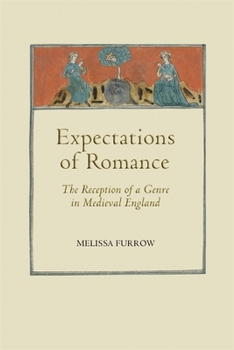Expectations of Romance: The Reception of a Genre in Medieval England
(Part of the Studies in Medieval Romance Series)
What did medieval readers think of romance? Their attitudes to it, and the implications for the genre, are explored in this provocative study. An important and powerful meditation on romance genre, reception and ethical/moral purpose -- amongst many other aspects of romance. Professor ROBERT ROUSE, University of British Columbia. Medieval readers, like modern ones, differed in whether they saw "noble storie, and worthie for to drawen to memorie" in romance, or "drasty rymyng, nat worth a toord". This book tackles the task of discerning what were the medieval expectations of the genrein England: the evidence, and the implications. Safe for monastic, trained readers, romances provided moral examples. But not all readers saw that role as valid, desirable, or to the point, and not all readers were monks.
Working from what was central to medieval readers' concept of the genre from the twelfth century onward, the book sees the changing linguistic, literary, religious and political contexts through such heterogeneous lenses as Denis Piramus, Robert Manning, and Walter Map; Guy of Warwick and Guenevere; chansons de geste and fabliaux; Tristram and Isolde and John Gower's uses of the pair as exemplary; Geoffrey Chaucer as reader and writer ofromance; and the Lollards, clergy, and didacts of the fifteenth century. MELISSA FURROW is Professor of English at Dalhousie University.
Working from what was central to medieval readers' concept of the genre from the twelfth century onward, the book sees the changing linguistic, literary, religious and political contexts through such heterogeneous lenses as Denis Piramus, Robert Manning, and Walter Map; Guy of Warwick and Guenevere; chansons de geste and fabliaux; Tristram and Isolde and John Gower's uses of the pair as exemplary; Geoffrey Chaucer as reader and writer ofromance; and the Lollards, clergy, and didacts of the fifteenth century. MELISSA FURROW is Professor of English at Dalhousie University.
Format:Hardcover
Language:English
ISBN:1843842076
ISBN13:9781843842071
Release Date:November 2009
Publisher:Boydell & Brewer
Length:274 Pages
Weight:1.65 lbs.
Dimensions:0.9" x 6.2" x 9.2"
Customer Reviews
0 rating





